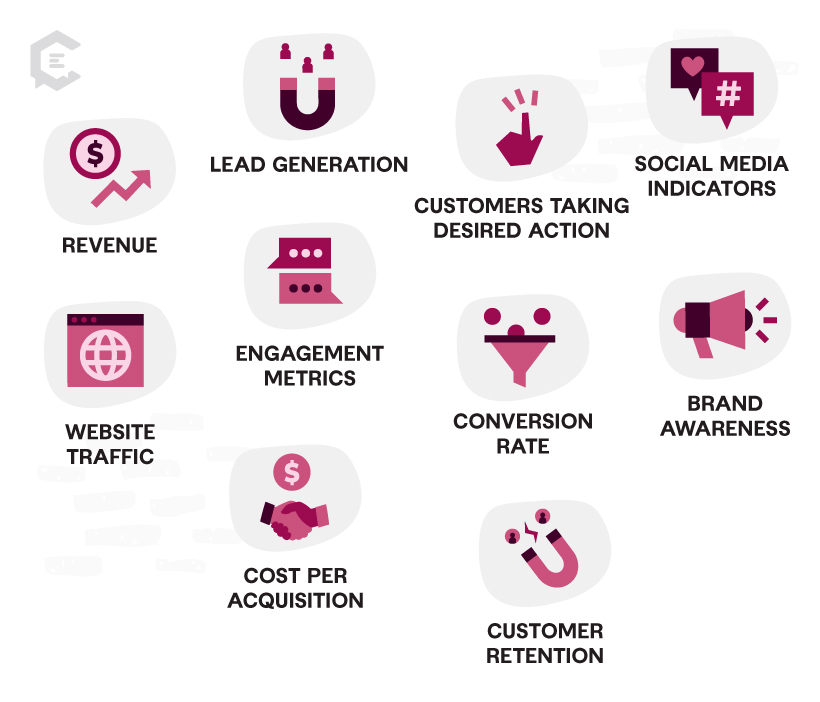What are key performance indicators (KPIs)?
KPIs are the measurements businesses use to determine how effective a specific initiative is and has been. While KPIs are applied to many different aspects of a business, for this conversation, we’ll focus solely on marketing KPIs and how you can apply them to your marketing initiatives.
It’s important to note that while these may be difficult to track where marketing is concerned, KPIs are quantifiable values against which you’ll measure your initiatives’ performance.

Why are KPIs important?
Imagine you’ve spent a significant chunk of your content marketing budget creating and implementing a blog strategy. It’s taken several months to get up and running, but now the content is live, and the higher-ups want to know how it’s going. What will you tell them?
Has there been an increase in site traffic? Better ranking on SERPs? Have you seen an uptick in revenue/conversions?
KPIs are important because it’s impossible to determine your level of success if you don’t have a standardized unit of measurement for it. The keepers of the purse strings may only care about money, but that may not have been the specific goal of your blog strategy.
Having a set of clearly defined KPIs keeps everyone aligned with the goal and lets you know when changes must be made.

What KPIs are important for content marketing?
Keeping in mind that different initiatives will have different goals, here are some KPIs that you’ll typically encounter with content marketing:
- Revenue. No surprise here, but remember that when designing a revenue KPI, you need to establish a concrete link between your content and the revenue it helps generate.
- Lead generation. How many leads came in through your content campaign?
- Customers taking desired action. Here, the desired action is not necessarily the purchase. Did they share a post? Call your sales team? Set up a demo?
- Social media indicators. These can vary but usually include mentions, comments, likes, shares, and subscriptions.
- Website traffic. Consider not just the numbers but where the traffic is coming from.
- Engagement metrics. How are users interacting with your content?
- Conversion rate. This can help determine the effectiveness of your content in driving leads or sales.
- Brand awareness. This can include social media reach, mentions, and SERP rankings.
- Cost per acquisition. How much does it cost to acquire a new customer via content? Include your content production, distribution, and promotion costs here.
- Customer retention. What’s your churn rate? Customer lifetime value? Repeat purchase rate?

How do you determine KPIs?
Key performance indicators will differ from business to business, but to determine what’s right for you, follow these steps:
- Define your content marketing goals. Let your needs drive the decision process, as opposed to the convenience of using an existing solution.
- Identify the metrics that align with your goals. For example, if your goal is brand awareness, how will you measure that?
- Consider your target audience. Do they read blogs or hang out on social media? Plan your metrics accordingly.
- Align KPIs with budget and resources. Advertising can be expensive! If you don’t have the budget for it, consider more cost-effective KPIs.
- Monitor and adjust your KPIs over time. Your needs and goals may change, so make sure you adjust the plan as needed.
How can you measure your KPIs?
Thankfully, there is a wealth of analytics tools currently at your disposal today. Of course, your needs will be determined by your business’s individual goals and KPIs, but some great options are:
- Google Analytics
- Social media analytics tools
- Customer relationship management (CRM) software
- A/B testing tools
- Marketing automation software
- Business intelligence tools
These will present the information, but ultimately, it’s up to you to determine what’s really valuable information. “Impressions” and “reach” can give you an idea of how many people saw your content, but they can’t draw a straight line to how much revenue was ultimately generated.
Content marketing is more difficult to quantify than other initiatives, but it can be done! When you have a clear set of goals and expectations, you can choose the metrics that matter the most and apply the tools to get the data you need.

Get Started Setting Your KPIs
You start at the very beginning, of course! Before considering your KPIs, you want a solid content strategy in place. Whether you’ve got a plan you want to tweak or you’re starting from scratch, ClearVoice can help! When you speak with one of our content strategists, they will:
- Showcase how we can help support your marketing goals
- Explore your current challenges with producing great content
- Discuss your current content strategy and operations
- Share an overview of ClearVoice and our solutions
- Answer your questions about our solutions
- Outline the next steps for building a Content Plan
From there, you can decide how involved (or uninvolved!) you’d like to be in the content production process. With ClearVoice as your managed content solution, we’ll create KPIs with you so you can be sure you’re reaching your content goals.
Talk to a content strategist today! Your measurable content success awaits.



